
Part 2 of our conversation with Tareq Baconi, author of the new memoir, Fire in Every Direction. The book is a chronicle of his political and queer coming of age growing up between Amman and Beirut as the grandson of refugees from Jerusalem and Haifa.
Transcript
AMY GOODMAN: This is Democracy Now!, democracynow.org, The War and Peace Report. I’m Amy Goodman, with Nermeen Shaikh.
We continue with Part 2 of our conversation with Tareq Baconi, Palestinian analyst and writer. He has just written a memoir. It’s titled Fire in Every Direction. He’s the grandson of refugees from Jerusalem and Haifa and grew up between Amman and Beirut. He’s the president of the board of Al-Shabaka: The Palestinian Policy Network. His previous book is titled Hamas Contained: The Rise and Pacification of Palestinian Resistance. His award-winning British Film Institute short film is titled One Like Him. It’s a queer love story set in Jordan. He’s former senior analyst for the International Crisis Group on Israel-Palestine.
Again, congratulations —
TAREQ BACONI: Thank you.
AMY GOODMAN: — on this beautiful memoir, Fire in Every Direction. I wanted to start off by you commenting on what it is like to write an autobiography, saying that you were “writing my way into being.” Explain what you meant.
TAREQ BACONI: Well, I mean, I think that it’s — I never thought of myself as someone who would write a memoir. I also think of myself as a very — as an intensely private person, so the idea of writing something like this and putting it out in public was just not — not something that came naturally or organically to me.
But I also thought, and I also believe, that a lot of these narratives are absent. And if I had grown up in Amman with these narratives being available to me, my upbringing would have been different. And there was something about the absence, the silence, that really animated or animates my desire to write through these things. And I think this is what I mean when I say “writing my way into being.” It’s creating space for my lived experience to be present in the discourse, to not be rendered absent or invisible.
I think there’s something that’s funny in Jordan, where, you know, obviously, there’s an understanding that there are queer folk, but no one talks about it. It’s kind of visible and invisible. It’s unspoken, and it only remains acceptable if it remains unspoken. And so, I think I’m pushing against that and saying, “Actually, it’s not — my presence here isn’t conditional. I can be here, and it can be — this is my narrative. This is the wholeness of my life. And I want to make space for it, and I want to force it into the conversation.” And so, I’m creating a chance for me to be, I think, yeah.
NERMEEN SHAIKH: And it’s not only that, of course, because in doing that, you’re also giving to people there the thing that you didn’t have —
TAREQ BACONI: Right.
NERMEEN SHAIKH: — namely, a narrative in which they can see themselves reflected.
TAREQ BACONI: Right, right, and a narrative that isn’t a reduced narrative or a simplistic narrative. You know, I was trying to give a narrative of complexity, of a complex life, of all of the texture of life. And it’s, you know, often that there’s this discourse of — you know, people fall into tropes. You know, if you’re a gay man, then you’re a hairdresser, or if you’re a gay man, then you’re — you’re — you know, and those tropes are prevalent, I think, especially for me — I felt they were prevalent back home — because people didn’t have the fullness of those communities in their lives. They couldn’t see the full diversity of what human life is in these communities. And so, I think it was, for me, important to just render my lived experience. It’s not sort of saying good, bad, you know, I’m trying to humanize, I’m not trying to humanize. It’s just rendering a human narrative and putting it out there.
NERMEEN SHAIKH: And this narrative begins with you going through a box that’s gifted to you from your friends. So, explain what’s in the box and what prompted that moment.
TAREQ BACONI: Yeah, so, this box is a box that has traveled with me all over the world. You know, I’ve moved to a bunch of different places over the course of my adult life, and this box, which was gifted to me as a graduation gift, which had — I can’t even remember what it had — maybe chocolates or something, has traveled with me. And this box had become, in some ways, an archive.
So, it’s the place where I put all of the letters that I exchanged with Ramzi, so, this boy who I met in my early teens, who was my neighbor and a school friend, and whom I developed very strong feelings for. And he was probably the most important person in my life, outside of my family, growing up, and was someone I loved dearly. And we used to write each other letters. So there was a correspondence. Even though we would see each other every day, there was a correspondence that gathered, where everything that we couldn’t quite say to each other, we would write to each other, and we would leave these letters on each other’s beds or backpacks or — and hand-deliver them by friends or whatever it was. And so, I have this archive of his letters.
And it was a relationship that ended very abruptly. I haven’t spoken or heard from him in about 25 years now. But I’ve always felt that those letters held at least something about my life, even though the letters I have were the ones he’d written, but it helped me understand what I must have written to him. And so, all of the silence that I’m talking about, everything that I couldn’t quite articulate then, I always felt that I might be able to articulate through the letters.
AMY GOODMAN: Why did it end abruptly?
TAREQ BACONI: Well, because I decided to tell him that I had developed feelings for him, and it was my way of coming out and acknowledging that I was a gay man and that I had — I was grappling with my sexuality, in a space where it’s — you know, it’s a homophobic society, and it’s very difficult to articulate these things. I’m talking here in the late '90s. So, at a different age, no internet, there's no discourse that can hold this content. And still, somehow, I felt that I could tell him that I had developed feelings for him, that I was attracted to him.
And I did what I did, what we normally did in those days, which was to write a letter to him and to tell him this through letter form. And his mom discovered the letter, and the response was very swift. I was basically excised from the family. I wasn’t allowed to see him anymore, and I — you know, it created a whole drama in my family, and I ended going back into the closet for about seven years.
NERMEEN SHAIKH: Despite this, you write about him later in the book, about Ramzi, that he becomes, quote, “the most intimate companion to my thoughts, like a child’s invisible friend.” So, if you could talk about that, how his memory was so formative many, many years after you’d lost touch?
TAREQ BACONI: Yes, he became — because he almost disappeared from my life, you know? It was overnight. After I make this incredible declaration, he suddenly is nowhere to be seen. I don’t see him, and I don’t engage with him or his family. I get excised from many parts of the community. And so he disappears.
And I have this moment where I’m having this conversation with him in my head, but he’s not there. And he becomes this stand-in for everything that I couldn’t be. You know, he’s this straight man who is admired by the community, who is popular, who goes on to do great things. And I feel that I’m everything that he’s not. So, he’s everything that’s good, and I’m everything that’s bad. And so he becomes this figment of my imagination that I’m just holding as the marker of what I should be. If I could be better, or if I could be stronger or handsomer or smarter, then that’s what I would be. And so, he becomes, in some ways — it actually — I think of myself now as holding him. It actually doesn’t matter what the real Ramzi is doing or who the real Ramzi is. What matters is this imprint that he’s left in my mind as someone who has defined masculinity, in some ways, and has defined man-ness, what it is to be a man coming out of that space. And so, I end up thinking through a lot of these things in the book, against the figment of what he is, not against who the real he/him is.
AMY GOODMAN: Let’s keep going back in time. This is a memoir. Early on in the book, you were like 5 or 6 years old, and you get your mom to buy you a doll. And as you sit with the doll next to you, you say, quote, “The look Mama and Laith gave me was one I would become intimately familiar with. It was a look not unsettling enough to upset me, yet not so innocuous as to be forgotten.” Elaborate.
TAREQ BACONI: Yeah, it’s this look — I mean, these looks that I would get throughout my childhood and teenage years, where, again, it’s going back to the unspoken. There are no words necessarily that are explaining what this look is, but something gets communicated. And what’s getting communicated is: “What’s happening here? There’s something that’s not quite right. There’s something that’s not fitting into the mold of how we think about propriety or how we think about how boys should act, how we think about” —
AMY GOODMAN: Your mother bought you the doll.
TAREQ BACONI: She bought me the doll, much to her dismay, because I was — I was about to throw a tantrum if I didn’t get that doll. So, she was, you know, making space for that. But also it was a look of questioning. I don’t know that it was a judgmental look. I don’t think it was a judgmental looking inasmuch as it was a questioning look: You know, “What is happening here? We don’t quite understand. I don’t quite understand how to deal with this.”
And I have to say that over the course of the years, and even after I, you know, come out — I’m openly queer now. My mom is — and my family know, you know, and they’re loving and proud and supportive. But there is an acknowledgement that during those years, it wasn’t only me who didn’t have the language. They didn’t have the language. They didn’t know how to deal with this or how to articulate it or engage with it. And so, that’s what the look is. There’s sort of — from them.
And then, from others, I think it was a more judgmental look, a sort of a — and certainly from bullies, and certainly from people who were intimidated, unsettled, upset, disgusted by whatever, however I was acting or behaving in those spaces.
NERMEEN SHAIKH: And probably also unconscious desires and perhaps their own —
TAREQ BACONI: Absolutely.
NERMEEN SHAIKH: — sexual orientation.
TAREQ BACONI: Absolutely.
NERMEEN SHAIKH: But one of the things — I mean, when you initially tell your parents, your mother, who then urges you to tell your father, I mean, their response is, you know, it’s a phase.
TAREQ BACONI: Yes.
NERMEEN SHAIKH: You’re going through this, and it’ll pass.
TAREQ BACONI: Yes.
NERMEEN SHAIKH: It’s totally normal for kids to be, you know, attracted to boys, girls. It’s fine. Just go through it, and eventually you’ll like a girl. So, if you could comment on that, and then also the fact that you said Ramzi came to signify what it means to be a man, but at the same time, you have your father, who also does that? I mean, if you could just make the link?
TAREQ BACONI: Absolutely. I mean, I think that there’s this impression that, or maybe thinking at the time that, you know what? Even if you are attracted to men, it kind of doesn’t matter. You’re still going to get married. You’re still going to have children. You’re still going to have to live this life that we live here. This is who we are. You’re thinking through things that are just not applicable here.
And then, I remember when I finally did properly come out to my father and tell him, his response to me was, “Cambridge did this.” I had gone to Cambridge to study. And his response to me was, “This is — this is their shit. This is — these are their values. You don’t bring this here. Even if you feel this way, you’re still going to have this life that we expect.”
And so, this vision of what being a man in the region is, and I think this is where Ramzi becomes that. I mean, obviously, I had my older brother. I had my father. These were very, sort of, in some ways, patriarchal men that were very clear in terms of what this model of manhood looks like. And I was just not that. I just wasn’t that. And so, they — but the difference with Ramzi is that he was my peer, and so he was growing into that vision of manhood, and I was, despite all of my efforts, not able to get there.
And so, this becomes then a thing of, “Oh, but only if you try harder, then you will get there.” And I think this creates a lot of, obviously, a sense of failure and a constant self-flagellation. And I think that was the thing that I had to overcome, to sort of accept that there are different visions of manhood.
AMY GOODMAN: You beautifully depict how your father’s attitude changes. Talk about first telling him, talking about telling you to leave, and what he came to accept before he died.
TAREQ BACONI: Yes, he came to accept everything before he died. You know, he — I never felt, even in the hardest periods of our relationship, when I knew that he was really struggling with what I was bringing to him in telling him that I’m identifying as a gay man, this is a life I’m living — even in his harshest moments, I never questioned that he still cared, that he still loved me, and so that was never ruptured. And so, I think we were both able to sit with a period of not knowing what this meant, so talking around it, but not really through it.
And I think that was important for him to then see that, oh, I haven’t changed as a person, and actually that I’m happier, and actually that I’m growing, and I’m grounded, and I’m developing the things that I want to be developing and professionally working through the things I want to work through. I think he was — I think he had seen gayness as something that would destroy my life. And I think once he understood that it wasn’t going to do that, he was able to sit with it a bit more. And he grew. He grew into accepting it in ways that I would have thought impossible in my childhood, and still don’t take for granted now. He’s gone. He’s gone. And the thing is, his journey is something that’s intimately familiar to me, because I went through that journey of understanding, you know, what it means to overcome this fear of, you know, identifying as gay, and in our region. And to be able for him to go through that journey and hold it by the end is incredible.
AMY GOODMAN: Even coming to love your husband, Seth.
TAREQ BACONI: Absolutely, even coming to love my husband, even coming to love my partnership, to — you know, it’s — to embrace my partner as part of our family, I think, has become — was not something I took for granted.
NERMEEN SHAIKH: But another person who’s very important to you and prominent in the memoir is your grandmother, Tata. So, if you could explain — I don’t know whether there was a sense of — the response that you received from the two — three generations, if we count your brother, and your relationship to them, how it shaped who you became?
TAREQ BACONI: Yes. So, Tata, my maternal grandmother, is a refugee from Haifa, who grew up — who then moved to Lebanon and then fled the Civil War to Amman. So she was displaced twice. And she was a very Christian woman. She was very, very much a believer. And she — because when we ended up in Lebanon, my parents were, you know, economically not well-off, and my parents were both hard-working professionals. And so, we were often left in my grandmother’s care. She lived with us. And she — in many ways, I think of her as a maternal figure. She, you know, raised me, alongside my mother and my father, and instilled very deep values in me.
And she was a very quiet woman, very humble, very forgiving, you know, never spoke about her experience of dispossession from Palestine with anger. It was always through the lens of forgiveness. It was always through the lens of fate: This is what the universe had for us. And so, she instilled a lot of those values in me, I think, but also helped me understand Palestine and where we come from. I think that that sort of got transferred to me through her.
NERMEEN SHAIKH: Yeah, and, I mean, that’s one of the things that comes across in the memoir, is the sense, which you don’t state explicitly, but it kind of suffuses the narrative, which is one that you have inherited, in a sense, her having been twice displaced, your mother, as well. If you could talk about that, the what they call now intergenerational trauma? It was not your experience, and yet you experienced something like it.
TAREQ BACONI: Absolutely. And I don’t — I don’t know that I ever understood it as intergenerational trauma, but I knew that I — I knew that there was something about my grandmother’s silences, her pain, and there was something about my mother’s anger and her rebellion. Both of these shaped my experience. And it’s funny, because if I think about my brothers, for example, my brothers don’t necessarily — are not necessarily active in the way that I am, or politically active in terms of organizing. And I feel like a lot of that emotional journey from my grandmother and my mother ended up being deposited somehow in me.
AMY GOODMAN: You have a very strong sense of place, even as your family is displaced over and over again. In Part 1, we talked about you returning, you going to Palestine. And you write about how Palestine infused Amman for you. And you write, “Palestine thrives unnamed, between our four walls: in our sensibility, our ache, our politics, our collective memories, our desires. Walking throughout Palestine, I was haunted by the specter of a past community and recalled lives I never lived, in a lost world that had been passed on to me through Tata’s love. No, not lost; stolen.” So, take us more fully into that journey back to Palestine.
TAREQ BACONI: Yes, I mean, in this yellow box that we’re speaking about are Ramzi’s letters, but there are also my grandmother’s diaries. And those diaries were diaries that she had written before her expulsion. You know, she was expelled from Palestine in her late teens. And so, the diary is vivid. And she wasn’t very much of a storyteller in her diary keeping, but she would record things that would happen, you know, people who would get married, people who would get sick, people who would travel for work, whatever the case might be.
And when I went to Palestine, there was this very strong sense that even though there’s all this Israeliness, that there’s all these layers of, you know, the settler colony over Palestine, but, for me, Palestine felt very accessible. And I could imagine her life, and I could imagine it because I also think that that’s how she communicated her life to me. So, everything became visceral. It’s almost like I could embody or inhabit Palestine, even though I had never been there. It sort of just got texture and got color and got smell and got magic. And so, it felt that I was — in some ways, her diaries were almost like a portal. Like, I could imagine what life she could have lived before '48 and what could have happened if the Zionists hadn't arrived and if she had continued to live that life. It was very visceral for me.
NERMEEN SHAIKH: And the book, in fact, ends with you sitting with your grandmother. And you say, “Behind her closed eyelids, she imagines returning.” And you go on to say, “I too, conjure images of an alternative utopia to the world we are both sitting in. Unlike Tata, my destination is not a reconciled past but an imagined future where none of us must cover, or absent, a part of ourselves to live.” So, if you could talk about that? And then, also tell us — it’s a very, very courageous decision for you to have written this book. Were there any authors that you were inspired by? In other words, rather than — as you’d said earlier, this could have been written with a pseudonym. It could have been written as fiction. Were there authors that told you or inspired you to actually just write it as a memoir in first-person voice?
TAREQ BACONI: Yeah, absolutely. I mean, one of the key authors for me is a Moroccan author called Abdellah Taïa, who has written books like An Arab Melancholia or The Salvation Army, I think the only openly queer writer writing nonfiction as memoir in the Arab world. I mean, I think there are — there are a few more recently, but when I was growing up, he was sort of this paragon of what — the power of what putting this kind of narrative out into the world is. And other memoirists have really inspired me, including people of color in the U.S., writing through — so, people like Kiese Laymon, writing through their questions around race and queerness. And I think I’ve always been attracted to the power of this genre, to the power of memoir, to people thinking of these works as political works, as works that are sort of pushing back against the hegemonic narrative.
And, you know, to the first part of your question, I think, for me, it’s not about — when I think about return to Palestine, it’s not about going back to pre-'48. I don't necessarily think that that’s the quest for what liberation is. You know, the colonization and apartheid has happened. It’s really about how we dismantle these structures of power, these structures of violence, and what they’re doing. And so, when I think about imagining a future where we hold ourselves whole, thinking through some of the memoirists who are thinking about these questions even in the U.S., this is the question: How can we all envision a way of being, a way of living, that’s not conditional, you know, that’s not focused on, you know, you can be a person here, a queer person, but not a Black person, or you can be — you know, how can we think about breaking through these identities and create ways of being that are egalitarian?
AMY GOODMAN: Tareq Baconi, we thank you so much for being with us, Palestinian analyst, writer. He has just written his memoir. It’s called Fire in Every Direction. He’s the grandson of refugees from Jerusalem and Haifa, grew up between Amman and Beirut. He’s the president of the board of Al-Shabaka: The Palestinian Policy Network. His previous book is titled Hamas Contained: The Rise and Pacification of Palestinian Resistance. His award-winning British Film Institute short film is titled One Like Him, a queer love story set in Jordan, former senior analyst for the International Crisis Group on Israel-Palestine. To see Part 1 of our discussion, go to democracynow.org. I’m Amy Goodman, with Nermeen Shaikh.

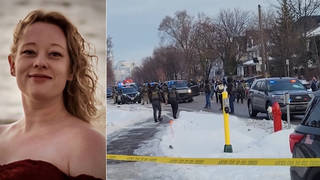


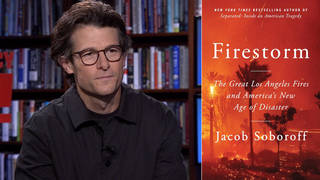

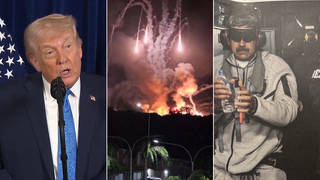
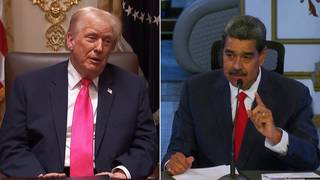
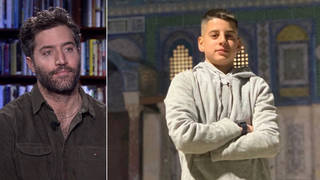


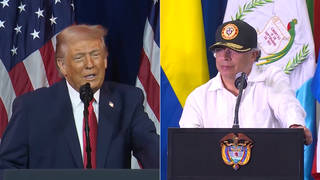
Media Options